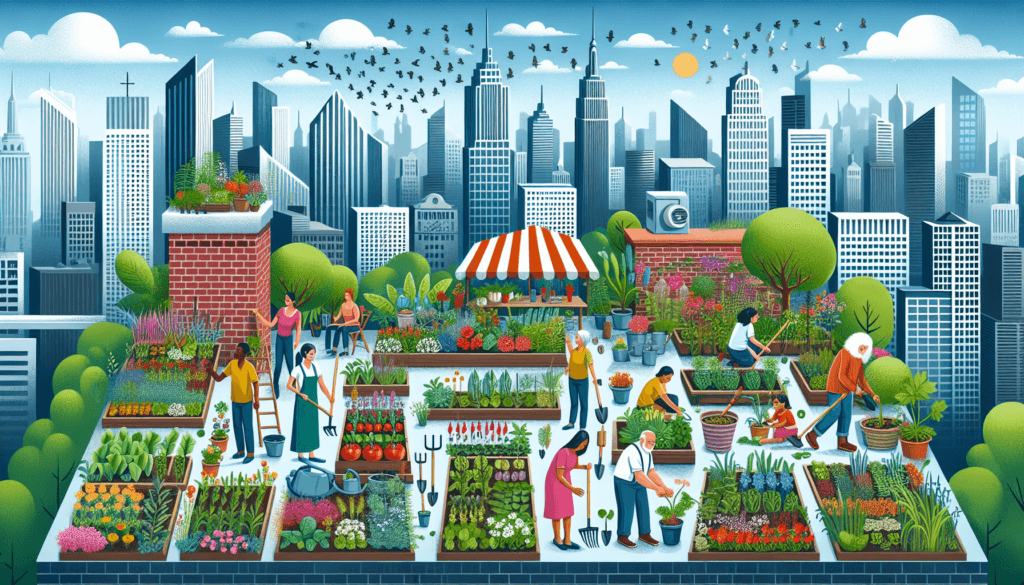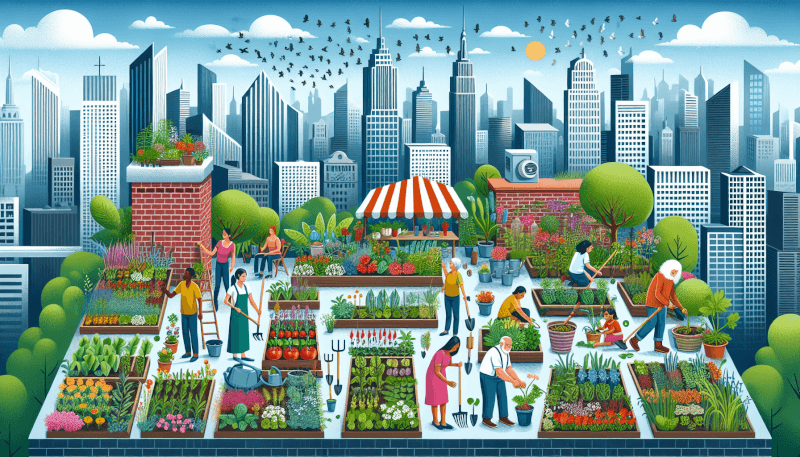Urban gardening is not only a fulfilling hobby but also a beneficial practice for the environment. By utilizing small pockets of space in urban areas, individuals can grow their own fruits, vegetables, and herbs, reducing their dependency on commercially grown and transported produce. This reduces the carbon footprint associated with transportation and allows for increased access to fresh, local, and organic food. Additionally, urban gardens can mitigate the effects of urban heat islands by absorbing heat and releasing moisture, thus improving air quality. So, whether you have a rooftop garden, a balcony filled with potted plants, or a community garden plot, your urban gardening efforts are making a positive impact on the environment. Urban gardening, also known as urban agriculture or urban farming, offers a multitude of benefits for the environment. By reducing food miles, conserving water, improving air quality, enhancing biodiversity, mitigating the urban heat island effect, reducing waste, promoting sustainable practices, building community, supporting the local economy, and providing stress reduction and mental well-being, urban gardening has a positive impact on both the local and global ecosystem. Let’s dive deeper into each of these areas and explore how urban gardening truly contributes to a healthier, more sustainable planet.

Reducing Food Miles
Locally grown produce is one of the core principles of urban gardening. By cultivating crops and raising livestock within city limits, the distance between the food source and the consumer is significantly reduced. This reduction in food miles leads to a decrease in carbon emissions associated with transportation. By choosing to grow your own fruits, vegetables, and herbs or supporting local urban farms and markets, you can greatly contribute to minimizing the environmental impact of our food systems.
Conserving Water
Water scarcity is becoming a global concern, and urban gardening provides an opportunity to conserve water through efficient usage practices. Implementing methods such as drip irrigation and using moisture-retentive soil can greatly reduce water wastage. Additionally, rainwater harvesting systems further aid in water conservation. By collecting rainwater, urban gardeners can supplement their water needs without relying solely on traditional water sources, thereby reducing the strain on municipal water supplies.
Improving Air Quality
Urban areas often suffer from poor air quality due to higher levels of air pollution. However, urban gardening presents an effective solution by contributing to oxygen production and air pollutant absorption. Plants, especially trees and green spaces, release oxygen through photosynthesis, helping to replenish the air we breathe. Moreover, vegetation acts as a natural filter, trapping and absorbing harmful pollutants, thus improving the overall air quality in urban environments.
Enhancing Biodiversity
Urban gardening plays a crucial role in supporting and enhancing biodiversity. By creating habitats within city landscapes, both plants and animals can thrive. Urban gardeners can incorporate native plants, which attract a variety of wildlife, including birds, butterflies, and bees. These pollinators are essential for the reproduction and survival of many plant species, including food crops. By providing suitable habitats and supporting pollinators, urban gardens actively contribute to the preservation of local ecosystems and biodiversity.

Mitigating Urban Heat Island Effect
Urban areas tend to experience higher temperatures compared to surrounding rural areas, creating what is known as the urban heat island effect. This effect is primarily caused by the heat-absorbing qualities of concrete and asphalt prevalent in urban landscapes. However, urban gardening can help counteract this heat island effect by providing shade and cooling. Trees, tall plants, and even vertical gardens can help reduce ambient temperatures, providing relief and improving the overall comfort of urban dwellers.
Reducing Waste
Waste reduction is a key aspect of sustainability, and urban gardening offers several opportunities to minimize waste generation. By implementing composting practices, urban gardeners can convert organic waste, such as kitchen scraps and yard trimmings, into nutrient-rich compost that improves soil fertility. This not only reduces landfill waste but also avoids the need for synthetic fertilizers, which can have negative environmental impacts. Furthermore, urban gardening encourages the reduction of packaging waste by growing your own food and minimizing reliance on store-bought produce wrapped in excessive packaging.

Promoting Sustainable Practices
Urban gardening promotes and demonstrates a range of sustainable practices. Organic gardening methods, such as avoiding synthetic pesticides and fertilizers, prioritize the health of the environment and human well-being. Permaculture techniques aim to create self-sustaining ecosystems by utilizing natural patterns and cycles. By adopting these practices, urban gardeners can contribute to the regeneration of urban landscapes while minimizing negative impacts on the environment.
Building Community
Urban gardening provides an avenue for social interaction and community building. Shared community gardens and allotments foster connections among neighbors, allowing people to learn from one another, share knowledge and skills, and strengthen community bonds. These spaces serve as important gathering places, promoting inclusivity and diversity while providing opportunities for education and awareness on sustainable living and gardening practices.

Supporting Local Economy
Urban gardening can have a positive impact on the local economy by supporting micro-enterprises and creating job opportunities. Urban farms and garden-related businesses contribute to local economic growth by providing fresh produce, plant nurseries, landscaping services, and educational programs. By supporting and investing in local urban gardening initiatives, you are not only contributing to environmental sustainability but also aiding the growth of small businesses and job creation within your community.
Stress Reduction and Mental Well-being
Connecting with nature has been shown to have numerous therapeutic benefits, reducing stress and promoting mental well-being. Urban gardening provides a unique opportunity for city dwellers to establish a connection with nature, even within the confines of urban environments. Spending time in green spaces, tending to plants, and observing the growth and transformation of your garden can have a calming and rejuvenating effect on your mental health, ultimately leading to a happier and healthier lifestyle.
In conclusion, urban gardening encompasses a wide range of practices and benefits that contribute to the well-being of both the environment and the people it sustains. By implementing sustainable gardening methods, conserving resources, supporting biodiversity, and fostering community engagement, urban gardening acts as a powerful tool in creating more sustainable and livable cities. So whether you have a small balcony or a backyard, consider embarking on your own urban gardening journey and join the movement towards a greener future.


